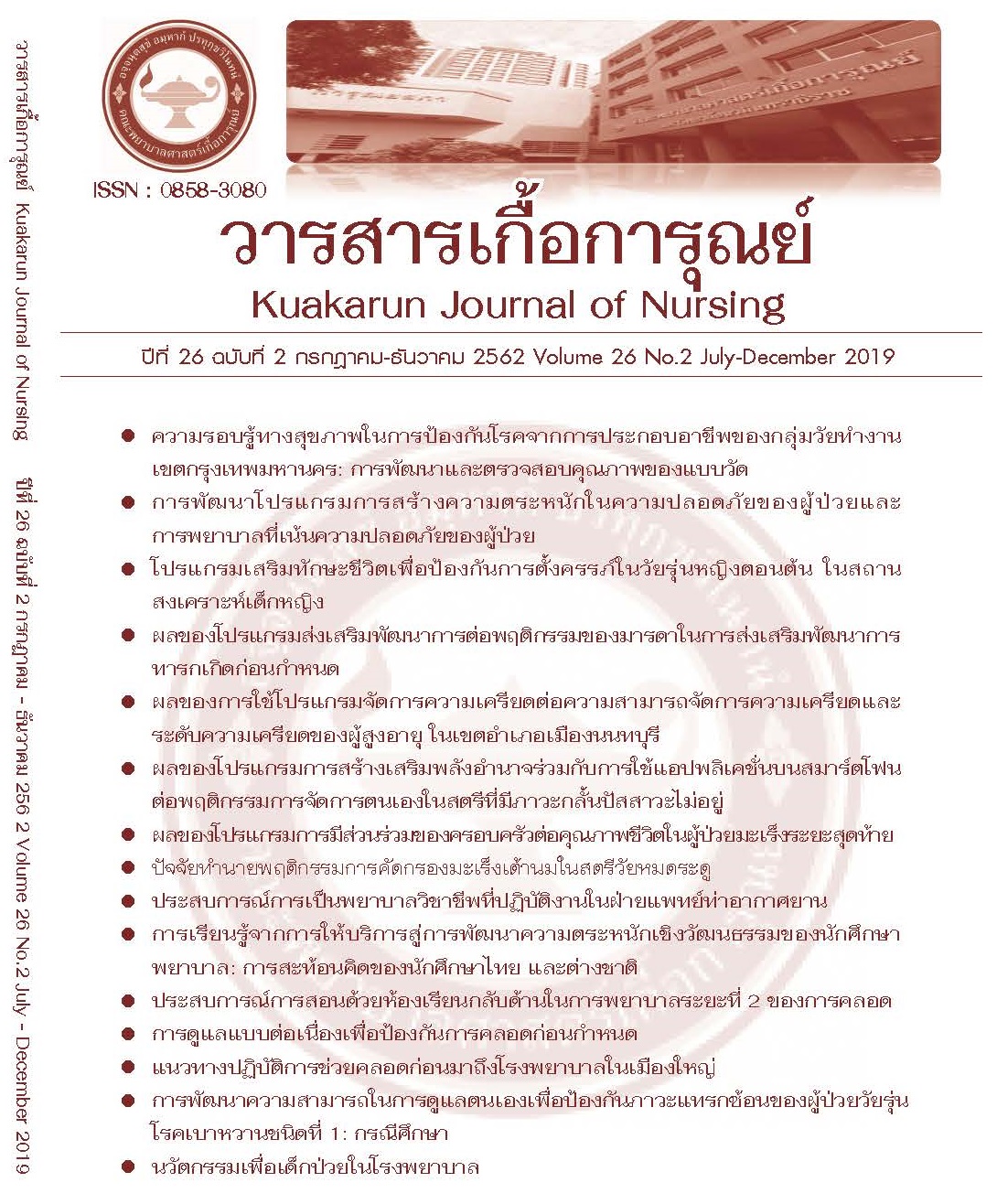การเรียนรู้จากการให้บริการสู่การพัฒนาความตระหนักเชิงวัฒนธรรมของนักศึกษาพยาบาล: การสะท้อนคิดของนักศึกษาไทย และต่างชาติ
คำสำคัญ:
ความตระหนักเชิงวัฒนธรรม, สมรรถนะทางวัฒนธรรม, การเรียนรู้จากการให้บริการ, นักศึกษาพยาบาลบทคัดย่อ
สังคมไทยในปัจจุบันมีความหลากหลายทางวัฒนธรรม จึงมีความจำเป็นที่สถานศึกษาพยาบาลต้องจัดประสบการณ์การเรียนรู้เพื่อผลิตบัณฑิตที่มีสมรรถนะทางวัฒนธรรม บทความนี้มีจุดประสงค์เพื่อนำเสนอประโยชน์ของการจัดประสบการณ์การเรียนรู้เพื่อพัฒนาความตระหนักเชิงวัฒนธรรมของนักศึกษาพยาบาลโดยกิจกรรมการเรียนรู้จากการให้บริการ และแบ่งปันประสบการณ์ของผู้เขียน และเพื่อเป็นทางเลือกสำหรับผู้อ่านที่สนใจสามารถนำไปประยุกต์ใช้สู่การพัฒนาสมรรถนะทางวัฒนธรรมของนักศึกษาพยาบาล เนื้อหาของบทความประกอบด้วยการยกตัวอย่างจากงานวิจัยทั้งใน และต่างประเทศ ตัวอย่างจากประสบการณ์ที่ผู้เขียนได้ดำเนินการในรูปของกิจกรรมเสริมหลักสูตร และตัวอย่างจากการสะท้อนคิดของนักศึกษาไทย และต่างชาติที่เข้าร่วมโครงการ พร้อมทั้งข้อเสนอแนะ เพื่อการนำกิจกรรมการเรียนรู้จากการให้บริการไปใช้ในการพัฒนาความตระหนักเชิงวัฒนธรรมของนักศึกษาพยาบาลต่อไป
เอกสารอ้างอิง
พัชรินทร์ เสตะจันทร์. (2550). ผลของการใช้กิจกรรมการเรียนรู้โดยการรับใช้สังคมที่มีต่อการปรับตัวเข้ากับ สังคมในมหาวิทยาลัยของนักศึกษา มหาวิทยาลัยอัสสัมชัญ กรุงเทพมหานคร. สารนิพนธ์ปริญญา การศึกษามหาบัณฑิต สาขาวิชาจิตวิทยาการศึกษา. บัณฑิตวิทยาลัย มหาวิทยาลัยศรีนครินทรวิโรฒ.
สำนักงานคณะกรรมการการอุดมศึกษา. (2560). ประกาศกระทรวงศึกษาธิการ เรื่อง มาตรฐานคุณวุฒิระดับปริญญาตรี สาขาพยาบาลศาสตร์ พ.ศ. 2560. ประกาศในราชกิจจานุเบกษา วันที่ 3 มกราคม พ.ศ. 2561
Amerson, R. (2010). The impact of service-learning on transcultural competence. Nursing Education Perspectives, 31(1), 18-22.
Campinha-Bacote, J. (2002). The process of cultural competence in the delivery of healthcare service: A model of care. Journal of Transcultural Nursing, 13(3), 181-4
Cupelli, L. (2016). An innovative service-learning project to develop cultural competency in undergraduate nursing students. Teaching and Learning in Nursing, 11(3), 113-117. doi: 10.1016/j.teln.2016.01.004.
Debonis, R. (2015). Effects of service-learning on graduate nursing students: Care and advocacy for the impoverished. Journal of Nursing Education, 55(1), 36-40. doi: 10.3928/01484834-20151214-09
Hfocus. (2019). การประชุมติดตามความก้าวหน้าผลการดำเนินงานศูนย์กลางด้านการแพทย์ (Medical Hub). สืบค้นจาก https://www.hfocus.org/content/2019/07/17361.
Knecht, G.J. (2015). Undergraduate nursing students’ experience of service-learning: A phenomenological study. Journal of Nursing Education, 54(7), 378-384. doi: 10.3928/01484834-20150617-04.
Kohlbry, P. & Daugherty, J. (2015). International service-learning: An opportunity to engage in cultural competence. Journal of Professional Nursing, 31(3), 242-246.
Long, T. (2014). Influence of international service-learning on nursing student self-efficacy toward cultural competence. Journal of Nursing Education, 53(8), 474-478. doi: 10.3928/01484834-20140725-02
Narayan, M.C. (2010). Culture’s effects on pain assessment and management. American Journal of Nursing. 110(4): 38-47.

















